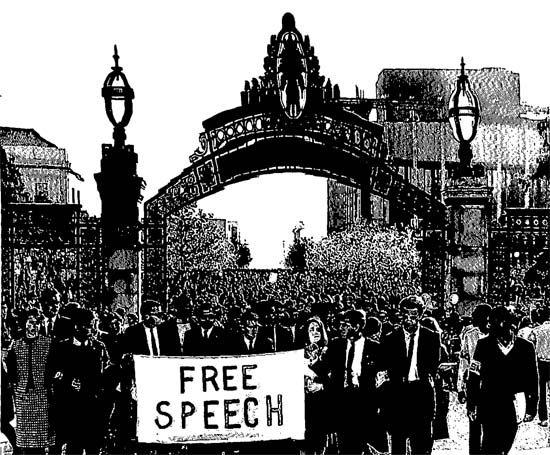On May 13, 1960, a group of UC Berkeley students unofficially started the Free Speech Movement of the 1960s, as they protested a meeting of the House Un-American Activities Committee taking place at San Francisco City Hall.
The movement at Berkeley quickly escalated, confronting civil rights, the Vietnam War and the Kerr Directives, which prohibited political action and speech on campus.
“It was mass dissent, a refusal to go along with the status quo on a massive scale,” said Eric Gardner, publications coordinator for the Cotsen Institute of Archaeology at the Fowler Museum of Cultural History and co-founder of UCLA Students for a Democratic Society.
UCLA Students for a Democratic Society aims to point out those aspects of society considered undemocratic and to find ways to change them, said Brad Rodgers, second-year graduate student and chapter co-founder.
“The main message, though, is to think for yourself,” Rodgers said.
Thus, in an attempt to raise awareness for the organization, which exists nationwide but had disappeared at UCLA, the new Students for a Democratic Society chapter held a screening of the film “Berkeley in the Sixties” on May 3.
The event also sought to draw parallels between the activism witnessed in the film and that which takes place on UCLA’s campus today.
For Gardner, while the activism of the 1960s died down considerably in the 1980s and ’90s, there appears to be a definite trend in student activism that resembles the upsurge that took place at Berkeley, as witnessed by the work of UCLA Fights Back and the events of the November fee increase protests and the March 4 Day of Action.
“There is a long road ahead to change this place to where we think it needs to be changed, but there has been involvement and a desire for change where it hasn’t been for years,” Gardner said. “My hope is that one day people will point back to the student movement of 2010, 2011, 2012 in California as a point where history was made.”
The need for student activism today was a sentiment also held by Kenneth Cloke, former professor at the UCLA School of Law, and an alumnus of UC Berkeley.
Elected president of the Associated Students of UC Berkeley in the early 1960s under the activist student political party SLATE, Cloke recalled an attempt to distribute activist literature which led to students blockading a police car, the Sproul Hall sit-in at Berkeley that led to the arrests of hundreds of students, and the meeting called by the administration that ultimately served as the turning point for the movement.
“We were losing all the way along the line, and there wasn’t much that we could do,” Cloke said. “Then a series of events occurred, the culmination of which was the meeting at the Greek Theater, in which the administration explained why they would not grant us our liberties.”
As the meeting progressed, Mario Savio, the unofficial leader of the Berkeley protests, walked to the microphone and attempted to speak, but was prevented by police from doing so.
Following the prevention of Savio from speaking, a series of strikes and increased faculty support finally led to the withdrawal of the Kerr Directives on the UC Berkeley campus.
Savio’s call to action on December 2, 1964, on the steps of Sproul Hall, has since become the iconic scene of the Free Speech Movement, garnering hundreds of thousands of views on YouTube and has been replicated in popular television shows and movies.
“Any student on a UC campus deserves to see Mario Savio’s “˜bodies upon the gears’ address at some point before they graduate,” Rodgers said.
“It was a beginning of a consciousness among large numbers of students that they could participate in their own education and have a say in how the university functions, rather than just passively accept the limited role prescribed for them by managers of the state and industry,” Rodgers added.
Looking forward, Cloke, Gardner and Rodgers said they hope protesting over university budget issues will evolve into a focus on other prevalent issues of today, such as war, sexism and racism, especially following the passage last month of Arizona’s anti-immigration law, Senate Bill 1070. Cloke also sees environmentalism as an area that deserves student attention.
“Countries have kept the United Nations weak, so the U.S. Senate and the U.N. cannot solve these problems,” Cloke said. “Who is left? The citizenry. These issue are critical and with no solutions on the horizon. Only if students become politically active again can we see these changes take place.”
